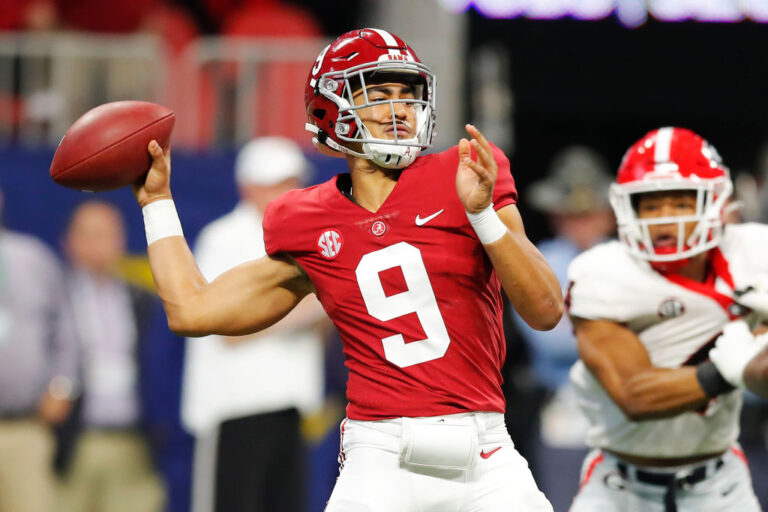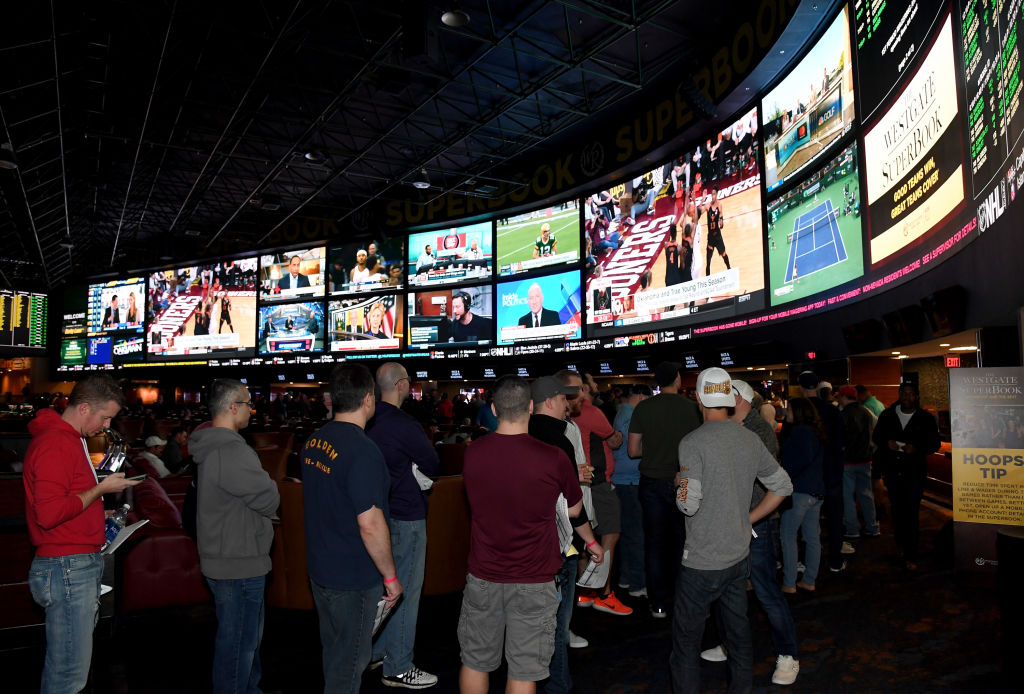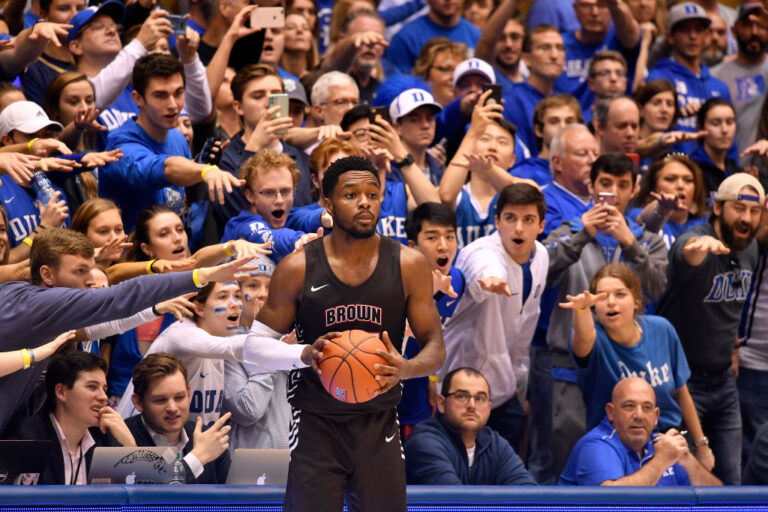Poll: Americans Are Becoming More Educated and Experienced With Sports Betting As More States Make It Legal
Why this matters
New Global Sport Institute national snapshot poll data show that while Americans support legal sports betting, the most consistent gamblers are becoming more interested. However, few consider how to handle excessive gambling or gambling among lower-income communities.
Sports betting has transformed what it means to be in the business of sports or a fan of sports in the United States, and such betting is expected to continue growing in the coming year. A U.S. Supreme Court decision to allow states to legalize gambling has led to rapid change in the industry, as states generated more than $3 billion in tax revenue over the first 10 months of 2021, while sportsbooks nearly quadrupled their ad spend over the same span. The court decision is largely supported by the American public, according to a new Global Sport Institute national snapshot poll of 2,400 Americans conducted in partnership with OH Predictive Insights.
A significant plurality, 44 percent of respondents, supported U.S. adults being legally allowed to bet on sporting events. This included 54 percent of males and 66 percent of respondents who had an average household income of $50,000 or more. Just 16 percent opposed, including 58 percent of respondents aged 55 and up and 68 percent of non-Hispanic White respondents. However, they may not have been speaking from personal experience: 62 percent of respondents said they do not gamble on sports.
A State-By-State Approach
In alignment with the Supreme Court ruling, a majority of those surveyed said states should decide for themselves whether or not to legalize sports betting. Despite the ruling, though, 79 percent said legalization would not affect their opinion of sports, while 74 percent said it would not affect their viewing habits. In most states, betting money becomes tax revenue, but this does not affect respondents’ view of sports gambling, either.
As more states legalize gambling, these markets are peppered with advertisements on television and social media for digital sportsbook companies like FanDuel, DraftKings, and BetMGM. As a result, nearly half of respondents said they had heard at least a “moderate amount” about gambling, including 54 percent in the Atlantic states, where legalization has happened more quickly. Of the mediums where people are hearing about gambling, sports broadcasts and TV were the most common sites for information, followed closely by friends and family, then social media.
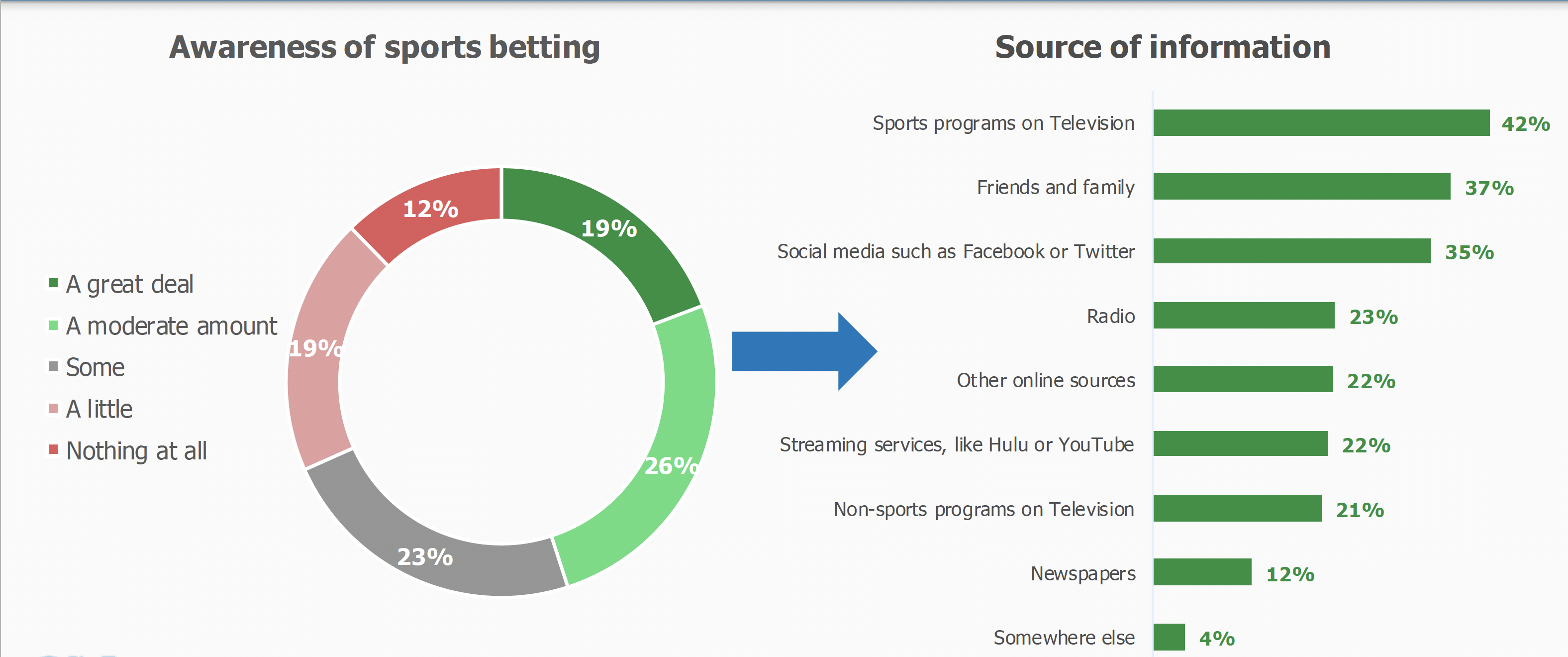
This, in part, could result from the fact that many states have not yet legalized gambling, meaning some parts of the country have not gotten the same attention. Moreover, time has not turned those who may have been squeamish about betting when it was not legal into newfound customers.
Today, frequent bettors are primarily adult males ages 18 to 44 who strongly favor major American sports leagues and often watch sports on TV. Among casual bettors (from one bet per month to one bet per year), only 39 percent often attend in-person sporting events while 71 percent said they often watch sports on TV. This group was relatively older than the frequent bettor group. Self-described non-bettors were mostly females over age 65 and people with an average household income under $50,000.
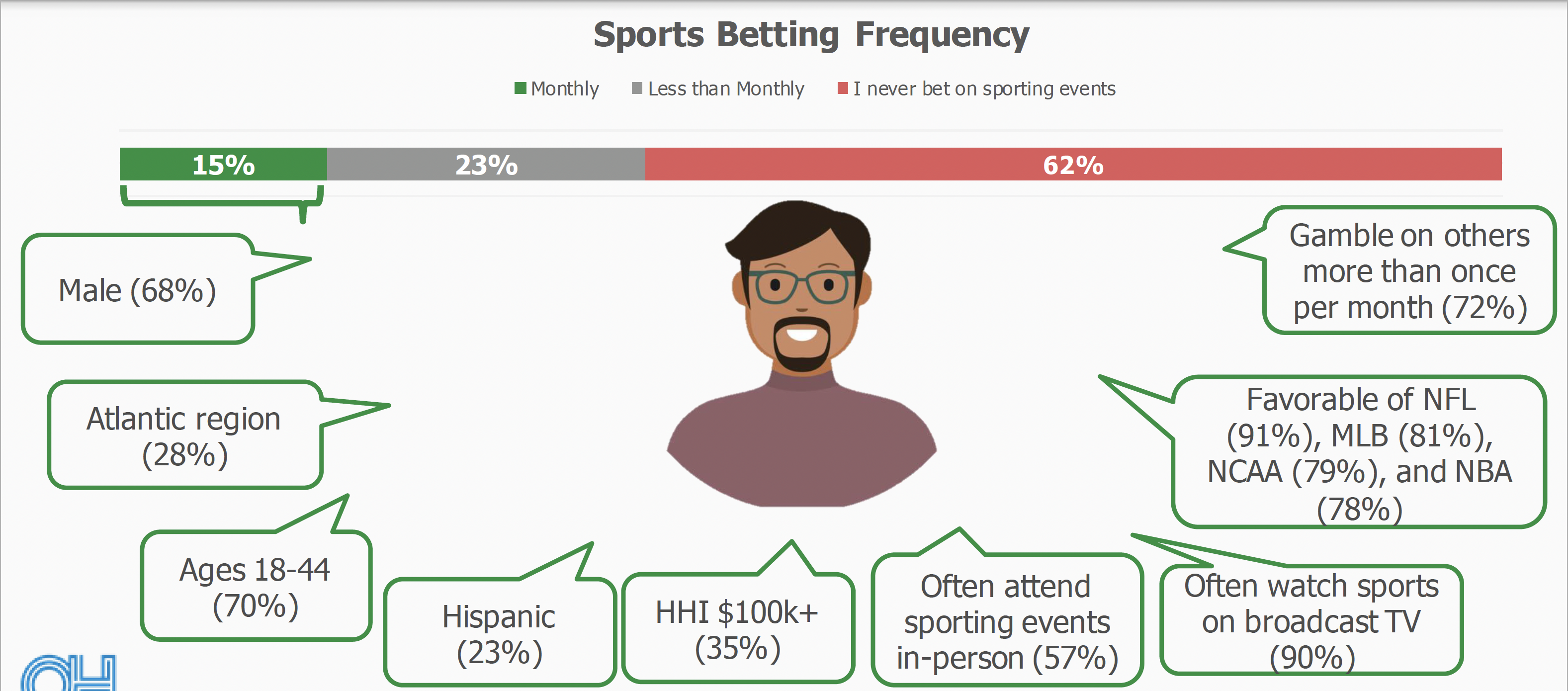
These non-bettors are more likely to oppose sports betting entirely, while frequent and casual bettors tend to be more supportive of gambling overall.
How People Are Betting
With legalization has come innovation, and anyone with a smartphone can place bets through sportsbook apps. Nearly one-third of respondents said they would gamble on sports less often if not for the ability to do so virtually. Generally speaking, younger, better-educated people were more likely to take advantage of betting on mobile apps. In contrast, middle-aged people and Black and Hispanic respondents said they would bet more often if they could do so only in person. However, nearly half still stated in-person betting as their preferred method.
Americans are not spending large sums on betting currently. Just 1 percent said they had spent more than $10,000 on sports bets in the past year, while half said their total expenditure was less than $100. Respondents who expressed fandom for major American sports leagues and consistent sports viewership on TV were more likely to place larger-than-average bets. And those who bet frequently overall were more likely to say they had placed a larger bet than they were comfortable with.
While the U.S. may be in the early stages of the legal sports betting era, those who have embraced it are becoming busier consumers in the broader sports world. Those who already spend time and money watching sports on TV or in-person were more likely to say they would watch more often because sports betting had been legalized.
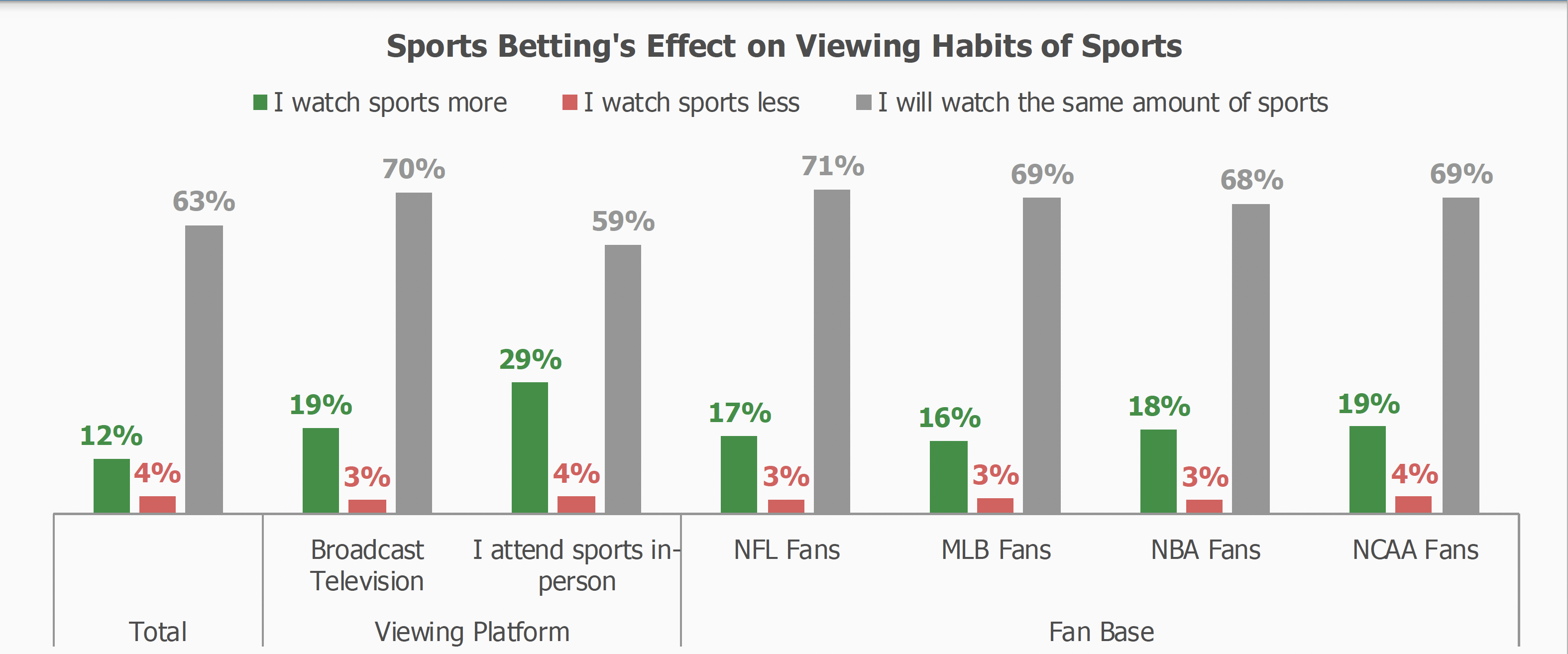
Keeping Control
As these passionate fans gravitate even more toward betting on and consuming sports, 85 percent of respondents supported mechanisms that might curb problem gambling. However, nearly half said they had not seen any reference to problem gambling in the world.
The most popular mechanism to prevent or treat excessive gambling was a spending limit, which a quarter supported, followed closely by treatment programs that would be paid for by sports teams and leagues and “responsible-betting campaigns.”
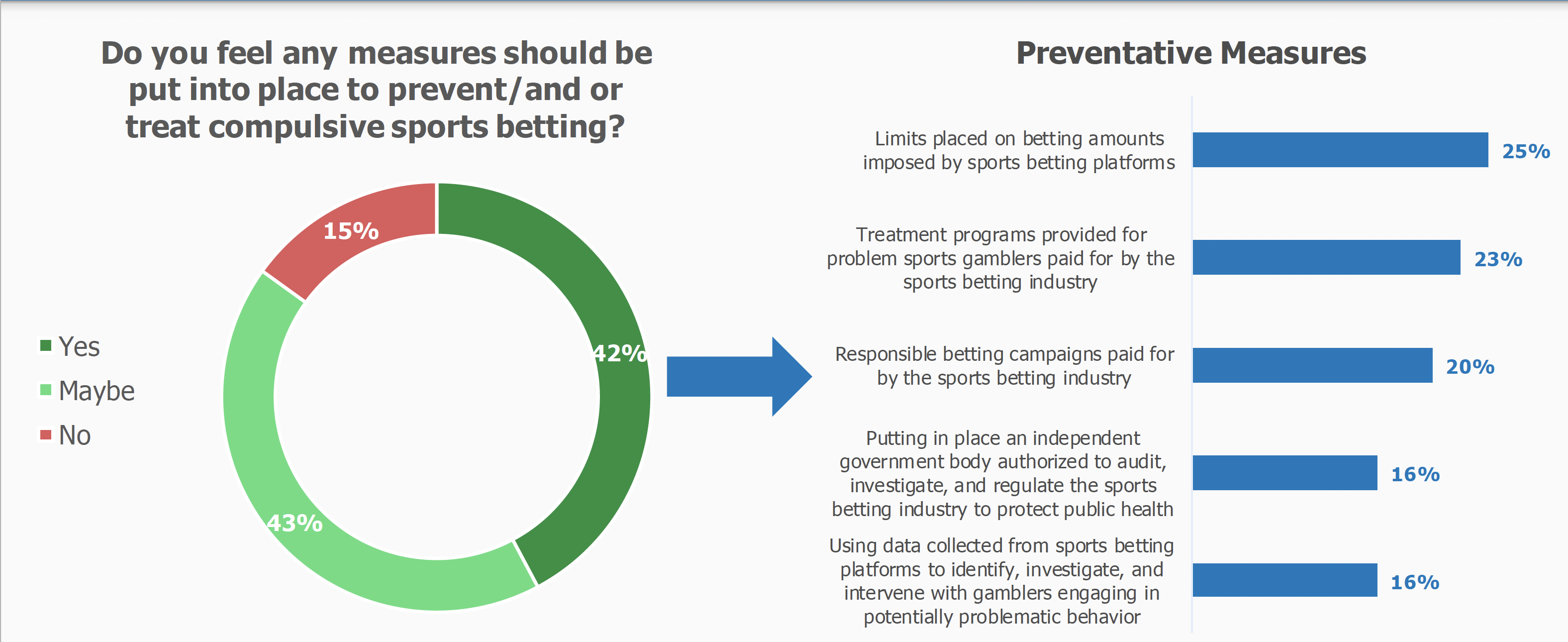
A majority of respondents said they believed the legalization of sports betting would not change Americans’ behaviors, compared to just 29 percent who worried that people with lower incomes might become susceptible to problem gambling habits. Respondents older than 65 were most likely to believe habits would remain the same. Those with incomes from $26,000 to $99,000 were most likely to worry about problematic habits for lower-income bettors.
In line with confidence that behaviors would not change, nearly three-quarters of those surveyed said they had never placed a bet that was larger than they were comfortable with. Just 13 percent said they had ever done so.
Monthly Issue
Passions & Pitfalls in American Sports Betting
Sports gambling in the U.S. has quickly gone from mostly illegal and largely taboo to widely embraced and increasingly pervasive. Yet as states, leagues, and fans all join a multibillion-dollar gold rush, there are questions about the effect of this shift on government finances, competitive and journalistic integrity, and public health.
U.S. sports fans may not have asked for betting to become part of their everyday lives, but in 2022, they suddenly find themselves navigating the minefield it presents.
Related
